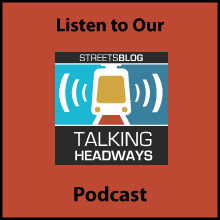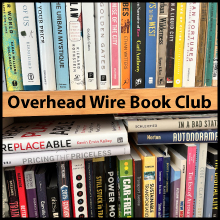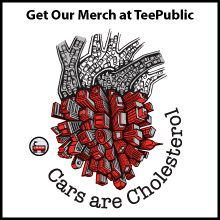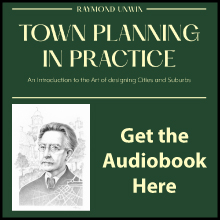(Unedited) Podcast Transcript 502: Transit Themed Rock Music
October 2, 2024
This week we’re joined by Cameron Mays, lead singer of the Transit Themed band The Frans. We chat about transit in Cleveland, the song writing process for transit music, and the parking lot in Erie Pennsylvania that inspired him.
To listen to this episode, visit Streetsblog USA or find it in our hosing archive.
Below is a full unedited AI generated episode transcript:
[00:09:27] Jeff Wood: Cameron Mays, welcome to the Talking Headways podcast. Thanks [00:09:41] Cameron Mays: Thanks for having me, Jeff. I’m excited [00:09:43] Jeff Wood: to be here. Well, thanks for being here before we get started. [00:09:45] Can you tell us a little bit about yourself? [00:09:48] Cameron Mays: Sure. I’m the lead singer and songwriter of the friends. We’re a rock and roll band out of Cleveland, Ohio, and all of our songs are about public transportation, riding the bus, riding the subway, riding the rail and all, all good things like that. [00:10:04] Jeff Wood: How did you get into that? [00:10:04] Like, what was the impetus for thinking, oh, well, we should write songs about transit. [00:10:09] Cameron Mays: Uh, a lot of things. Well, I was just, I wanted to start a band really bad. That’s the, that’s the big thing. I just, I want to do that. And I liked a lot of like kind of the political punk stuff and the political charged messages of some of those early rock records, but especially with those early rock records, there was sort of like a cultural, the songs were written in consumerism. [00:10:31] They’re written about, you know, driving around in your cars and having stuff like that. So. I just thought it’d be kind of a different take at writing old school music, having this sort of bus public transit angle, you know, so if I’m thinking about it really brandly, I think of it sort of like we’re taking something, this old kind of American cultural tradition and giving a sort of new public transit mind to it. [00:10:54] And that was it, you know, just. I wanted to start a band and I found a quick writing prompt that I wanted to write about. [00:10:59] Jeff Wood: That’s awesome. Have you always wanted to, I mean, like you always wanted to be in a band, but like, how has music impacted you from when you were younger up till now? I mean, I think a lot of us who grew up listening to music and, you know, loving and listening to the radio and stuff wanted to do that, but like, what kind of led you to that path? [00:11:15] Cameron Mays: Well, my dad was in a post grunge band in Cleveland and, you know, he is, you know, just a classic Midwest dad, you know, a little gruff and stuff like that. And when he talked about music and the band, he would just light up and have all these stories. Uh, his band did a lot of tours. They actually played with the Foo Fighters in Japan, you know, like, so like, since I was a kid, that’s just the stories that were told to me at bedtime. [00:11:40] And there’s always guitars lying around the house. So it’s just. It was an inevitable thing, you know, [00:11:45] Cameron Mays: The other thing too is, you know, I’m in Cleveland. So we have this sort of misguided sense that we started all this rock and roll stuff. So that’s the other thing too, is just people would be coming into town or field trips to the rock and roll hall of fame or things like that. [00:12:01] So it’s just something that is always kind of on our minds over here. So that’s [00:12:05] Jeff Wood: Cleveland rocks, right? Like that’s the, everybody knows outside of Cleveland. [00:12:09] Cameron Mays: Oh yeah. Yeah. Yeah. [00:12:11] Jeff Wood: So tell me about Cleveland as a transit town, right? Like, so as a place where people take the RTA and get around to their various destinations. [00:12:19] Cameron Mays: Yeah. Cleveland, well, it used to be a really, I still think it’s a great transit town. I don’t own a car. I’m really anti driving and I can get around pretty all right, but it’s just the story of towns all across America, you know, it had a really great street car network, especially on the East side. I’m preaching the choir here, but, uh, fine. [00:12:39] Yeah, so Cleveland specifically had a extensive street car network, particularly on the east side between what’s public square, which is kind of the center of Cleveland going out to around university circle and as things progressed, and we kind of started shifting our focus to car infrastructure and. [00:12:59] Couple that with, you know, redlining and racism and suburbanization. A lot of these street car lines got ripped up. A lot of just the efficiency of the transit system kind of got switched in favor of car infrastructure and things like that. So it’s, it’s tricky. And the people that need good transit infrastructure are the ones kind of the most disenfranchised and with the quietest voices. [00:13:20] But if you try, you can make it work, you know, and I get around pretty okay. [00:13:25] Jeff Wood: You said you’re anti driving. How’d that come about? [00:13:28] Cameron Mays: Actually, it’s from a parking lot in Erie, Pennsylvania. I was, went on a summer trip with my mom to Presque Isle. It’s just a little vacation, beach spot. And I was in maybe middle school and there’s this nature center over there that the parking lot just made so much sense to me, like it had like porous material, there was all these passages for. [00:13:51] People to get from the car to the nature center, like clear pathways that were protected. And not you weren’t sharing with cars or anything like that. And there’s these big irrigation dishes and things like that. And I don’t know why I was just thought this was the coolest thing. And that was like the seed and you know, I get back and slowly there’s these parking lots in the little suburban town. [00:14:11] I grew up and quickly became like, why can’t it be more like that? One parking lot. And then slowly it turned from like parking lots to why can’t we have cars? Why do we have to have things designed for cars? We’re like, why can’t I walk to the place I want to be? And that was it, you know, started with just a little parking lot. [00:14:26] Jeff Wood: I bet the designer of the parking lot would love to hear that story because they probably thought about it for a long time and were like, I hope this impacts somebody and here we are with somebody who wrote a whole, a whole album of transit songs generated from the one parking lot. So I love that. [00:14:40] Cameron Mays: Every once in a while I’ll meet someone from Erie and I’ll be like, you know, that nature center by Presque Isle with the parking lot. And they’re like, what are you talking about? Like, no, it’s it’s. I’m [00:14:49] Jeff Wood: going to look it up now. I’m going to look it up on the, on Google maps. That’s awesome. So how did you all get started as a band? [00:14:56] I mean, like, how did you gather all your bandmates and get together and are they on board with this as well, or they just want to play music? [00:15:02] Cameron Mays: Oh, they’re super on board with it. So our first drummer was just somebody I knew from high school. And then, so half the songs are written by me. Other half are written by my friend. [00:15:13] Gabriel, who’s also in the band as our lead guitar player. And Gabe, I told Gabe just about the concept of the band of wanting to do kind of a public transit rock thing. And Gabe, same boat as me, hates driving, doesn’t have a car, you know, uses the bus exclusively and was just immediately on board. And so we kind of just got to work getting that and Gabe’s. [00:15:36] Way better musician than I am, studied flamenco guitar and just has kind of a wealth of knowledge. And it worked out really well just because the things I was more interested in, which was, I mentioned earlier, I liked a lot of the kind of political concepts of the 70s punk, but I really, the music I really like listening to was like 60s pop music. [00:15:59] And Gabe also really loved like the early classic rock stuff, but had a much broader knowledge on 70s, 80s, 90s, all sorts of music. And we just linked together really well. And the cool thing about like, you know, like the 60s pop movement and the 70s punk movement is they all kind of had like the roots all the same, you know, of these Bo Diddley records, Chuck Berry records and stuff like that. [00:16:21] So we, Always kind of had this common sense in a common language. It’s just where we went from that. Then with our bass player, Hope, they saw us once and just bought a bass. And started learning the explicit purpose of being in the band. Same reason, I mean, same feeling as Gabe and myself, they don’t drive. [00:16:39] They don’t have a car. They take the bus, take the red line in Cleveland. And that was it, you know, and just worked out for us. [00:16:47] Jeff Wood: That’s awesome. Yeah. You talk about older influences. I’m wondering if you have any like modern ones or ones. Do you feel like you guys sound like, [00:16:54] Cameron Mays: I don’t know. We really like kind of keep our head in the sand, you know, like an ostrich. [00:16:58] Because I think. To us, there’s sort of this cultural mission to just sort of weave ourselves into the music we liked growing up and the music we still kind of get perpetually inspired by. So I don’t know. I mean, that’s not to say there’s not modern stuff that we like listening to, but it’s just. I think it’s the old stuff that, you know, informed our dreams and made us want to play music in the first place. [00:17:21] So [00:17:22] Jeff Wood: you say, you say old stuff, which is funny because I grew up in the eighties and you know, some of the stuff that I feel like was part of my lexicon is on oldie stations and stuff. So I’m like, am I that old now? You know, the oldie stations I growing up Was what you, you were talking about Chuck Berry and, and all the fifties and sixties stuff. [00:17:38] Right. And then now it’s like, Oh, from the eighties and nineties, I’m like, Oh my gosh, I cut my teeth on the post hardcore in the late nineties. Right. And so it’s just, it’s so weird to think about time scales, you know? [00:17:50] Cameron Mays: Yeah, no, that’s contemporary to us too. You know, like we were saying that stuff is modern to us. [00:17:54] You know, what’s being played right now on the radio. That’s like the future. We don’t, we don’t even comprehend it. [00:18:02] Jeff Wood: I like that. Yeah, I, I listened through the whole thing last night. I really enjoyed it. And, um, I have like these albums that I just like love the album straight through, but nobody seems to like, listen to a whole album anymore. [00:18:15] I mean, I just like have, you know, hundreds of CDs where I’m just like, I love that album. There’s a couple songs on there that I would probably recommend, but like, I want you to listen to the whole thing because it tells a story. Right. [00:18:25] Cameron Mays: Yeah. Well, we, we designed our album that way and we got it printed on vinyl, actually, um, I got a groove records. [00:18:32] And the other thing, so Gabe and I, we both really love classic rock and roll. We also both really like classical music. And I think we both really tried to think symphonically about connecting everything and arranging it in a way. And I think our last, like, what would be the B side, which starts with the song bird passing through, it sort of takes on this, Symphonic form to the end that I think the last three songs are all kind of woven together and and what the production and yeah Like people I don’t think listen to albums the way, you know They used to and I mean it’s always been like a singles market since the inception of rock and roll. [00:19:13] That’s what it was I think the fact that albums even took off is sort of a miracle in a weird way, but I think there’s lots of people like us that prefer listening to it in its entirety and taking it as its own thing and you just gotta make it for them. I hope that a couple of things stick out the other way. [00:19:32] Jeff Wood: Yeah, no, I appreciate that. I mean, I just have so many like formative albums that I listen, I could listen to the whole thing and I know every word of every song and there’s probably, you know, 40 or 50 albums like that, where I just feel like, you know, I’m really connected to this. Well, so I’m wondering how the writing process works. [00:19:47] Like, so you sit down, you know, one of your bandmates comes up with an idea. You guys are like, okay, we need to write about BRT. We need to write about transit in Cleveland. We need to write about the bus. Like, how does that all, how does that all come together? [00:19:59] Cameron Mays: The songs on our first record, it’s pretty variable, but there was kind of almost like a pitch process that I think is sort of different than a lot of musicians and, and what we’ve been working on right now, it’s totally different. [00:20:14] Now it’s, I think more what musicians kind of just do naturally where it’s like, Hey, I got this idea. Hey, I got this idea and combine together. But what we used to do is we’d sort of pitch the idea of what we want to write about. And usually you had like an idea of like. This is going to be the chorus. [00:20:31] This is going to be the whatever, but you kind of pitch it and see if people laugh or people are like, Oh, that’s a good idea. Like, um, subway, Sally, for example, that was Gabe and I came back from a trip to, from New York city. And I was sort of like the next practice. I, I’ve been thinking about, I think we should write a song about like someone that’s just kind of this mythical magic woman that’s burrow hopping and, you know, jumping around New York and partying and riding the train out there. [00:20:55] It started as a pitch and Gabe, our old drummer, was like, yeah, yeah, yeah, let’s do it. [00:21:13] Next song, I kind of came up with like a little bit of a chorus and uh, my first verse and we went on from there. So it started like we’d kind of have a conceptual aim of the song and if we all kind of agreed like, yeah, this would be a good one, this would be funny, this would be whatever, then we’d, we’d keep going with it. [00:21:29] So I think it’s very different than what a lot of Do, but like I said, we always went into it with this sort of conceptual mind at first that I think we needed to kind of have a roadmap and sort of intellectualize it first before we turned it into a song and went from there. [00:21:48] Jeff Wood: I love all the local references too. [00:21:50] I mean, you smoking on the BRT heading down Euclid Avenue, what’s the most obscure reference you could fit in that people in Cleveland would understand, but maybe others might not. [00:21:58] Cameron Mays: Um, well, I think smoking on BRTs probably has the most references and that’s, of course, kind of based on a trip on the health line. [00:22:06] Which on that particular one, there’s a spoken word section, and that would be extremely obscure. You’d have to know a couple professors at Cleveland State and kind of create like a hodgepodge of them in your head. That one too also has, there’s a reference in that one that’s inspired by someone Cle I met him on the subway in Buffalo, New York. [00:22:30] And he’s just kind of a drifter that hangs out and he claims, he knows a bunch of actors that are from Buffalo. So I, I, if you’re from Buffalo, you might know who I’m talking about. I met him. Maybe the Goo Goo Dolls would know it, right? Yeah. Yeah. So, but yeah, BRT probably has the best ones and all that. [00:22:47] Just like, I always. Like when you take like New York City or Los Angeles, but I feel like New York is a little better. It’s like the way artists and singers and songwriters use that city. It’s almost, it feels like everyone’s been there, even if you’ve never been there and all these TV shows and stuff like that. [00:23:05] And I always just like thought, well, why can’t you just do that with, you know, wherever you’re at in Cleveland. And, and there’s, there’s another element of that just. Trying to pepper every song with these little references or call outs is that, um, I remember when I was a kid, so I was 12 years old, they were shooting the Avengers in downtown Cleveland. [00:23:23] And I couldn’t wrap my head around the fact that they were like, pretending that downtown Cleveland was New York City that didn’t make it. I’m like, why can’t they just say that? Why can’t they just have everything take place in Cleveland? You know, it’s like, that was my thought process as a kid. Which, you know, now I’m like, yeah, that’s kind of a stupid thing to think, but I think that’s just something important to connect at all to public transit, almost every town, especially the Midwest and Northeast, like even the smallest towns have little train systems, little bus systems. [00:23:54] And, you know, you got to romanticize where you’re at. You can’t always just be dreaming about New York city and Los Angeles. You know, you gotta. Take what you got and love what you got. [00:24:04] Jeff Wood: I mean, that’s awesome. Yeah. There’s so much to love about the places where you grow up. Right. I mean, I talk about where I grew up in Texas all the time where, you know, it’s not trains, but it’s, it’s green belts and it’s pathways for biking and walking and those types of things. [00:24:14] And I take the good things from, from where I lived and not like there was a lot of bad things, but you know, I just like from my urbanist perspective. Frame of reference. Those are like the things that I talk about when I, you know, reference it to people, the other thing I talk about, I like to think about too, is like all of the times that I rode transit to shows, I grew up in Texas, I went to school in Austin, so I went to shows at emos and downtown there. [00:24:34] And then also here in San Francisco, I went to tons of shows that the Fillmore and bottom of the Hill and stuff. And I was taking the bus there and I always have. Good feelings about that. I’m wondering if you have any like best trips to the show discussions about taking the bus, thinking about what you’re going to go see, maybe afterwards you get off and you’re like all sweaty and hot for being in the club and yeah, you know, you got to jump on the bus with everybody else. [00:24:53] Cameron Mays: There’s this Joe Strummer quote that Gabe and I really liked that was like, just on terms of like dressing up and looking really crazy, it’s like. You’ve got eight channels of color TV. You gotta make it count. So we always, you know, we’re fighting with all these people’s attention. So we’d always just dress crazy and stuff like that. [00:25:10] That’s, that’s probably my favorite memory. It’s just like. Hop on a bus to a gig with, you know, a guitar case and I’m wearing crazy bell bottoms and, you know, like shirt with just one button buttons and just all the looks you get. But I think that’s part of the fun. And that’s part of what appeals to me. [00:25:27] And what appeals to me about public transit is you’re kind of on an amphitheater for your own city and you’re just, See in the city, you’re seeing people on the bus, you’re seeing all these characters and that’s sort of what I hope is someone sees me dressed crazy, carrying a guitar case, and they create their own little story of what’s going on in my world. [00:25:46] Jeff Wood: It’s a great advertisement. I mean, I didn’t think about that, but it is, it’s a great advertisement for where you are because it kind of is a culture. I know a lot of people come to San Francisco and they’re like, Oh, well, I, all these weirdos and people of different. Stripes than I’m used to from where I’m from are popping up here. [00:26:00] And that’s kind of the story I want to tell myself of the city. And most of the time, uh, lately it’s kind of been bad, which I lament, but for a lot of the years, it was really good. It was like, oh, I went to this amazing place and there’s all this cool stuff happening, right. And I really appreciate that. [00:26:14] I’m wondering also, are there any instances where your music maybe or talking about it influenced people to maybe try the bus for the first time or take the train for the first time? [00:26:23] Cameron Mays: All the time. All the time. Yeah. I I’d see this more with people not from Cleveland or inner city, like people from. [00:26:31] Maslin, Ohio, which is, you know, hour and a half out from Cleveland or like the small towns, you know, or the people in Canada, that’s, that’s the ones that really excited me that they would say, Hey, I tried the bus out here for the first, I, you know, it was kind of fun or whatever, you know? And yeah, it happened all the time and it’s just cool. [00:26:49] Or people in Cleveland, you know, taking like the red line to see a, you know, sports game, they’d send me a picture or, you know, or whatever. So yeah, it happens pretty frequently and it’s just always, you know, That’s me pretty excited. [00:27:01] Jeff Wood: That’s awesome. It makes me think of like, um, it makes me think of this date I had once here in San Francisco, where I was going to a show, I think it was the great American music hall downtown, and, you know, I met the person at the J church train stop, and then we took the train and then I found out that she had never taken the train before, which is really cool. [00:27:19] Or the bus. And she grew up in San Francisco and we get to the show and we stand there for two hours at the show and chat and whatever else. And then we get outside and she’s like, I think I’m just going to take a cab. And I was like, all right, see you later. Never, never to be seen again. And it must’ve been the transit, but you know what? [00:27:36] It’s a good way to maybe like filter a little bit. [00:27:39] Cameron Mays: Yeah. I think so. I mean, I think if you’re. You’re just not willing to be a little adventurous or put up with another human, other human beings, then that says a lot about, about that person. That’s a cast too much judgment, but [00:27:53] Jeff Wood: yeah, I’m not going to cast too much judgment either, just on the transit. [00:27:56] Right. Just transit. Yes. Yes. Do you have a favorite transit song outside of your own catalog? Cause I know that they’re kind of hard to find, if I’m being honest. Like there’s a Berlin that riding on the Metro is obviously a, you know, a popular famous one, but I don’t know of too many others. Piebald has a bike song. [00:28:15] Obviously Queen has a bike song, but I’m just, you know, wondering if you know of any others. [00:28:20] Cameron Mays: Um, I’d have to take a second to think about that because it’s weird. I think more songs about cars, right? I know [00:28:27] Jeff Wood: that’s the thing. [00:28:27] Cameron Mays: Yeah. And well, we always thought that the history of rock and roll is it came from these sort of rhythm and blues singers. [00:28:35] And, and our feeling was you have these old spirituals or old work songs about the railroad about or just walking, you know, and then, you know, Once it became sort of commercialized in the fifties, that’s when it all switched over to talking about cars and things like that. And of course that’s the stuff we like. [00:28:53] So it’s always, we always just felt like, you know, we were just trying to carry on what these old blues guys were doing, but favorite transit song. [00:29:02] Jeff Wood: Do you have a favorite one on your own album? [00:29:05] Cameron Mays: Well, the ones that I wrote, well, I like Subway Sally a lot because I think it’s sort of like a weird crosshairs of three different musicians. [00:29:14] I think there’s a little bit of Bo Diddley, a little bit of Chuck Berry, and a little bit of Little Richard. Those are all our heroes. But I really like our tune Three Man. It’s the last one of the album, and it’s kind of droning and experimental and amorphous. And I kind of like that, too. I think a lot of our album, we tried to kind of have this romantic image of the bus and You know, I think there’s something to be said about just taking the train and. [00:29:39] letting yourself kind of like stew or think about emotions and, you know, be unencumbered by like the responsibility of driving. And I think it’s a good spot to do it sometimes. Of the songs Gabe wrote, I think Rail City Gun is one of my favorites. [00:30:09] That’s a good sign about references to Cleveland that’s based off of. Gabe worked in Tower City, which is kind of the nexus of our rail system during the Republican National Convention. And they had this big thing that you can carry guns on the train, apparently. So the song is just kind of like about just this sort of crazy time in Cleveland, politically speaking. [00:30:34] And I think that song just has such a great energy to it, kind of captures the sort of old school Clash sound. We were asking earlier about just references to Cleveland. Gabe has all these sort of like Little hidden tips of the hats of like restaurants we go to all the time or people we know or people we see on the street. [00:30:53] Yeah, so that one’s my favorite of Gabe’s songs. I’d go as far as say it’s my favorite Fran song too. That’s awesome. [00:31:00] Jeff Wood: You also have a song about Jane Jacobs. Yeah. Are you guys gonna be a planning band too? What the hell? [00:31:07] Cameron Mays: That one’s super fun. Yeah, I wrote that after I finished reading Death and life of great American cities. [00:31:26] I got that book new and I just carried it around with me everywhere. And that’s a hefty book, you know, and it’s beautiful beige. I just, you know, I took it everywhere and now it’s like gray and faded and like ripped up and the edges are, but I, I read the heck out of that book. I enjoyed it a lot, but yeah, I just, originally I was going to call it Jane be good, you know, kind of like a Johnny B. [00:31:46] Good thing, but I was like, well, it’s not really like, it doesn’t really have that kind of like Chuck Berry, uh, drive to it. So. Yeah, that, that one’s a fun one. We played that one a lot in our tour. I tried to challenge myself to write what I call like a newspaper song. That’s something that, you know, if you had a newspaper, that little thin column, I want to have a song you could fit in a little column. [00:32:09] So yeah, [00:32:10] Jeff Wood: that’s awesome. I forgot to ask you actually how the name of the friends came about for a transit band. [00:32:16] Cameron Mays: So it was erroneously reported that it’s a pun on transit. That’s not true. It’s, um, Based off of Fran Lebowitz, the writer, I just like her writing. And I thought it’d be funny to like have a name that if you have a really heavy Cleveland Midwest, Chicago accent, it’d be hard to say like the France, you know, like, so I wanted to have something like that. [00:32:41] I actually, I met Fran Lebowitz and I told her about the band and she was really like, not a hoot. She’s like, yeah, so, but yeah, it cracks me up. [00:32:58] Jeff Wood: Nice. So what’s up next for you all in terms of like tours and, you know, are you starting to write more music? Like what’s up next? [00:33:05] Cameron Mays: Yeah, we’ve got a whole batch of new songs. [00:33:07] We’re just working on coordinating and getting something new with that. Other than that, you know, we’re just kind of taking a little bit of a break and just trying to push our, our record and let people know about it. [00:33:18] Jeff Wood: Yeah. Well, where can folks find it if they want to download, uh, all the songs. [00:33:22] Cameron Mays: So band camp is a classic, but you know, we, we don’t need the money. [00:33:26] So just don’t, don’t, don’t worry about it. You know, go to Spotify, go to, uh, Apple music, any streaming, anything like that. Just all we want people to do is listen to it, you know, ride the bus and listen to it, ride the train and listen to it and start, you know, romanticizing your commute. [00:33:42] Jeff Wood: Yeah, I love it. [00:33:44] Well, Cameron, we love that you started a band just for transit. I really appreciate you coming on the show and thanks for coming on. [00:33:50] Cameron Mays: Yeah. Thank you for having me, man. I really appreciate it. Enjoy checking out the record.







